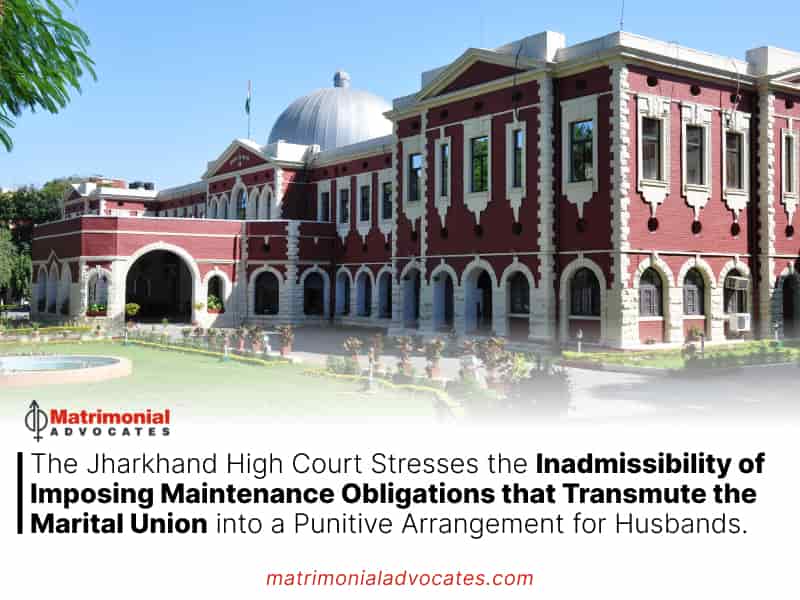
“During the process of reevaluating the awarded maintenance quantum in a matrimonial dispute, the Jharkhand High Court has enunciated a legal standpoint. This perspective accentuates the husband’s moral duty to provide maintenance to his spouse, thus enabling her to sustain a lifestyle commensurate with that enjoyed during their marital cohabitation. However, Justice Subhash Chand has judiciously cautioned against the imposition of financial obligations on the husband to an extent that effectively transmogrifies the institution of matrimony into a punitive experience.”
The aforementioned pronouncements were enunciated within the framework of the Jharkhand High Court’s partial acquiescence to a petition for the revision of a judgment rendered by the Family Court in Dhanbad. The pertinent Family Court judgment had directed the husband to disburse a retroactively effective monthly maintenance allowance of Rs. 40,000 to his wife, dating back to the inception of her initial petition.
In the factual milieu of this maintenance dispute, it was divulged that the husband and wife entered into wedlock in 2018, in accordance with Hindu matrimonial customs. Their conjugal relationship was swiftly marred by discord, primarily stemming from disputes surrounding dowry, coupled with instances of domestic discord. Subsequently, the wife found it imperative to vacate the matrimonial residence and seek refuge with her ailing parents, thereby encountering pronounced financial hardships, inclusive of her ability to meet basic necessities and defray medical expenses.
The wife asserted that her husband, a financially prosperous entrepreneur, derived substantial monthly earnings, approximating Rs. 12.5 lakhs, from various income sources.
Conversely, the husband contended that the Family Court’s judgment was flawed, asserting its failure to scrutinize his actual financial circumstances and responsibilities. Furthermore, the husband asserted his role as the exclusive provider for his family, encompassing his obligation to support his ailing mother.
In its adjudicative disposition, the court underscored the substantive relevance of Section 125 of the Criminal Procedure Code (Cr.P.C.) in India, emphasizing its function in advancing social equity and upholding human dignity, as enshrined in the preamble of the Indian Constitution.
The court, in particular, emphasized the imperative of ascertaining an equitable and pragmatic maintenance quantum. The court sought an equipoise, ensuring that the wife received adequate sustenance for maintaining a lifestyle akin to that of the marital abode without imposing an inordinate financial encumbrance upon the husband. The primary goal was to forestall destitution for the dependent spouse without disproportionately burdening the other.
In the specific case under consideration, the court took cognizance of the wife’s submission of Income Tax Returns for the preceding four years, notwithstanding her claim of an absence of any income source, thereby raising questions about her genuine financial situation.
The court further deliberated upon the wife’s educational qualifications, endeavoring to gauge whether her earnings could underpin a lifestyle commensurate with that within the marital domicile. Notwithstanding, the court acknowledged that even in the event of the wife possessing some form of income, the husband’s maintenance obligations remained extant.
Additionally, the court considered the husband’s obligation to provide for his ailing mother, who relied upon his support, while reproving the Family Court for its oversight in evaluating the husband’s financial responsibilities in the determination of the maintenance allowance.
The Court said, “The learned Family Court did not take into consideration, the liabilities of the petitioner – Niraj Kathuria while fixing quantum of maintenance, which are evident from the documentary evidence on record. The learned Family Court has assessed the income of the petitioner Rs.1.20 lacs to Rs.1.25 lacs monthly from Shree Shakti Infrastructure which was the gross income of the petitioner, not the net income. The learned Family Court has taken into account the landed property in the name of the petitioner at Pasari Barwa, Panduki and Mouza Amaghata totaling to Rs.28,46,529/-; but there is nothing on record that from these properties the petitioner was fetching any income.”
In light of the foregoing considerations, the court arrived at the determination that the judgment rendered by the Family Court was predicated upon erroneous assessments, leading to an inequitable disposition of the maintenance award. Consequently, the judgment of the Family Court underwent revision, culminating in an order wherein the petitioner was mandated to remit a monthly sum of Rs. 25,000 to his wife, with this provision taking effect from the date of her initial application. Simultaneously, the remaining directives issued by the Family Court were affirmed without alteration.





